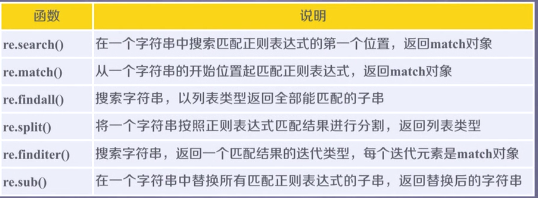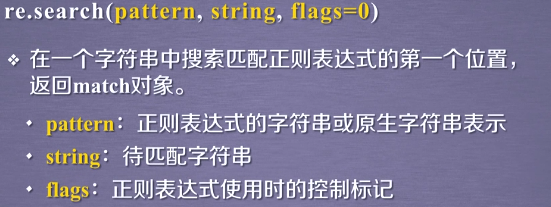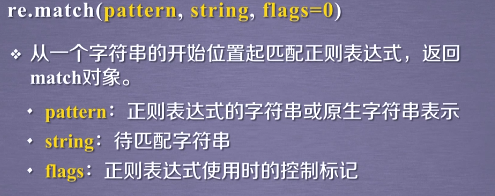re库是python的标准库,主要用于字符串匹配。
Re库主要功能函数

re.search()函数


re.match()函数

正则表达式
1.特殊字符
- ^h表示以h开头,.表示任意字符,*表示任意多次
import re line = 'hello 123' # ^h表示以h开头,.表示任意字符,*表示任意多次 re_str = '^h.*' if re.match(re_str, line): print('匹配成功') # 输出:匹配成功
- $表示结尾字符
import re line = 'hello 123' re_str = '.*3$' # 前面可为任意多个任意字符,但结尾必须是3 if re.match(re_str, line): print('匹配成功') # 输出:匹配成功
- ?表示非贪婪模式
import re line = 'heeeello123' re_str = '.*?(h.*?l).*' # 只要()中的子串 match_obj = re.match(re_str, line) if match_obj: print(match_obj.group(1)) # 输出:heeeel # 如果去掉?,则输出:heeeell
- +表示至少出现一次
import re line = 'heeeello123' re_str = '.*(h.+?l).*' match_obj = re.match(re_str, line) if match_obj: print(match_obj.group(1)) #输出:heeeel
- {2}表示前面字符出现2次
import re line = 'heeeello123' re_str = '.*?(e.{2}?l).*' # 匹配的是e+任意2个字符+l match_obj = re.match(re_str, line) if match_obj: print(match_obj.group(1)) # 输出:eeel
- | 表示或
import re line = 'hello123' re_str = '((hello|heeello)123)' match_obj = re.match(re_str, line) if match_obj: print(match_obj.group(1)) # 输出:python123
- []表示对单个字符给出取值范围
import re line = 'hello123' re_str = "([jhk]ello123)" # [jhk]表示jhk中的任一个都可以 match_obj = re.match(re_str, line) if match_obj: print(match_obj.group(1)) # 输出:hello123
- [^]表示非字符集
import re line = 'hello123' re_str = "([^j]ello123)" # [^j]表示不是j的都行 match_obj = re.match(re_str, line) if match_obj: print(match_obj.group(1)) # 输出:hello123
- s表示空格 S表示非空格
import re line = 'hello123 好' #字符串有空格 re_str = "(hello123s好)" # 匹配上空格 match_obj = re.match(re_str, line) if match_obj: print(match_obj.group(1)) #输出:hello123 好
- [u4E00-u9FA5]表示汉字
import re line = 'hello 北京大学' re_str = ".*?([u4E00-u9FA5]+大学)" match_obj = re.match(re_str, line) if match_obj: print(match_obj.group(1)) # 输出:北京大学
小例子 提取出生日期
import re line = 'xxx出生于2000年6月1日' line = 'xxx出生于2000/6/1' line = 'xxx出生于2000-6-1' line = 'xxx出生于2000-06-01' line = 'xxx出生于2000-06' re_str = ".*出生于(d{4}[年/-]d{1,2}([月/-]|d{1,2}|$))" match_obj = re.match(re_str, line) if match_obj: print(match_obj.group(1))